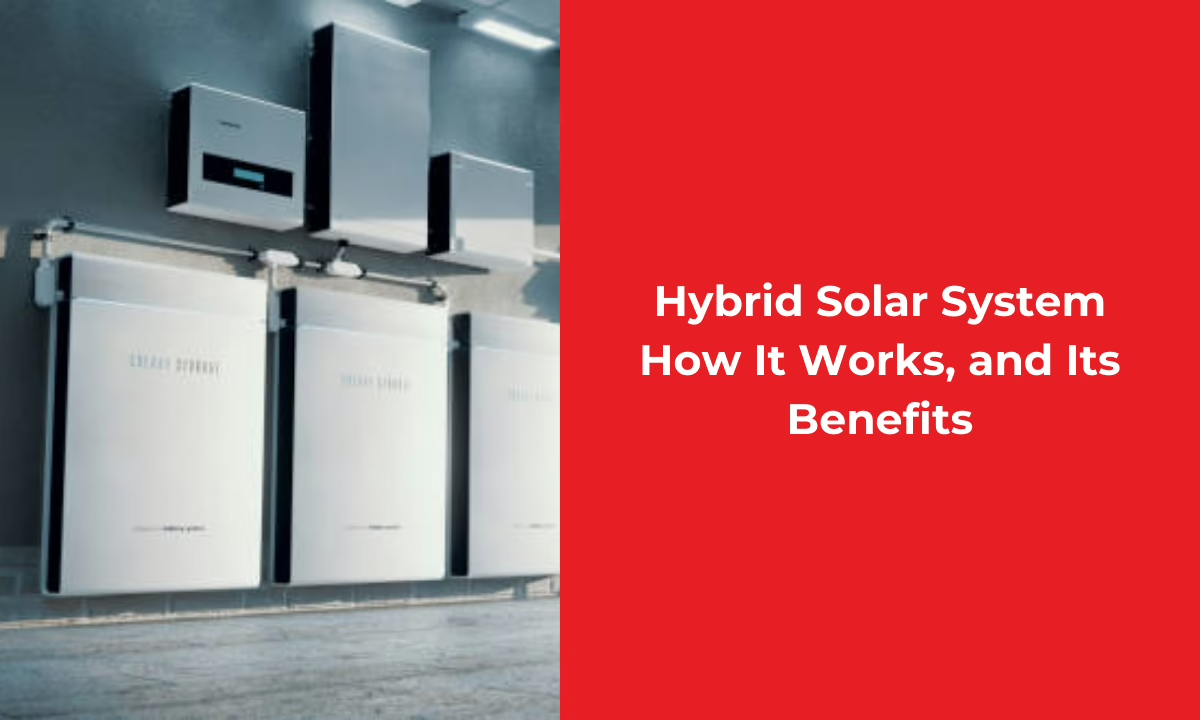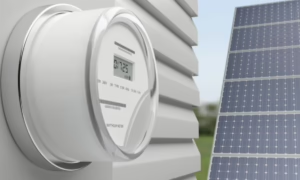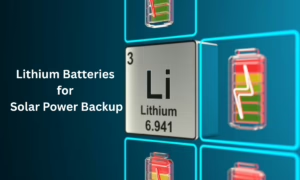As the need for renewable power keeps increasing, solar power has emerged as a prominent option among consumers and businesses. Among all the options one can look into, the hybrid solar system stands out for its efficiency, reliability, and affordability. But what is a hybrid solar system, and how does it work? We will find answers to these questions in this blog. We will discuss its parts, solar panel types, and the advantages of having a hybrid solar system at your home.
What is a Hybrid Solar System?
A hybrid solar system blends the advantages of grid-tied and off-grid solar systems. While most solar installations use the grid alone or battery storage alone, a hybrid system uses both. This is to say that you can charge up excess sun power in batteries and yet have access to the grid for supplementary power when the sun is not shining.
Compared to conventional solar systems, a hybrid installation is more flexible. It enables users to save excess energy for use at night or during emergencies and minimize grid dependency.
How Does a Hybrid Solar System Work?

A hybrid solar system produces electricity from solar panels and distributes it to household appliances. The system operates in three main operating modes:
- Daytime Power Consumption – Power is produced using solar panels and directly used by home appliances.
- Excess Energy Storage – Extra electricity produced by the solar panels is stored in batteries for use later on.
- Grid Backup Support – In case the stored energy is depleted or solar output is low, the system switches to the grid for extra power automatically.
By efficiently utilizing power consumption, storage, and grid reliance, a hybrid solar system provides round-the-clock energy supply.
Parts of a Hybrid Solar System
A hybrid solar system has some key parts that work in collaboration to maximize energy generation and utilization.
1. Solar Panels
Solar panels change sunlight into electricity. Various types of solar panels can be used, ranging from Monocrystalline Solar Panels to Polycrystalline Solar Panels.
2. Hybrid Inverter
The hybrid inverter controls the flow of electricity, transferring it between the solar panels, batteries, and the grid. It maintains the efficiency of the system.
3. Battery Storage
Batteries store surplus solar energy for future use, keeping residents supplied even in the absence of sunlight.
4. Grid Connection
Grid connection enables users to use electricity when required and sell surplus electricity if possible.
Types of Solar Panels Used in Hybrid Solar Systems
1. Monocrystalline Solar Panels
Monocrystalline panels are thinner and more efficient black plates. These include a solitary crystal structure permitting larger electron current to flow and generate more power, converting better sunshine into electricity.
Advantages of Monocrystalline Panels:
- Highly efficient (15-22%)
- Long-term reliability (25+ years)
- Stronger ability for low sunlight output
- Efficiently designed as they can occupy less area in a bigger battery
2. Polycrystalline Solar Panels
Polycrystalline solar panels consist of many silicon fragments melted together. Panasonic Solar Panels are famous for high-efficiency modules and long-lasting durability.
Benefits of Polycrystalline Solar Panels:
- Less expensive than monocrystalline panels
- Efficient (13-17%)
- Best for areas where sunlight is high
Major Benefits of Embracing a Hybrid Solar System in the Residence
1. Regular Power Supply
Round-the-clock power supply is one of the biggest advantages of a hybrid solar system. The system can even utilize stored power in batteries during power cuts, keeping houses running and going.
2. Less Electricity Bill
With a hybrid system, you minimize grid dependency, i.e., lower electricity bills. As you save excess energy for future use, you consume more self-produced power instead of purchasing from the grid.
3. Eco-Friendly Solution
A hybrid solar system encourages clean and renewable energy. By making a transition from fossil fuels to solar power, homeowners lower their carbon footprint and create a cleaner environment.
4. Better ROI and Increased Home Value
Investment in hybrid solar systems provides long-term cost advantages with less energy costs. Moreover, houses with solar systems command a higher resale price and hence an excellent investment.
Role of Solar Panel Distributors in India
It is important to find the proper solar panel distributor to make a hybrid solar system installation successful. Most solar panel distributors in India provide quality products and services. When selecting a distributor, inquire into the following points:
- Product quality and warranty
- Customer service and service availability
- Installation and maintenance facility
- Pricing and finance facilities
Conclusion
A solar hybrid system is the perfect option for homeowners who want energy autonomy, cost-effectiveness, and environmental friendliness. With solar panels, battery banks, and grid backup as power sources, it offers long-term power and minimizes reliance on conventional power sources. With high-efficiency solar panels such as Monocrystalline Solar Panels, Polycrystalline Solar Panels, Panasonic Solar Panels, and Livguard Solar Panels, customers can experience a green and efficient energy solution.
Sunap a leading provider of renewable energy solutions, is making hybrid solar systems more accessible to consumers. Sunap specializes in high-quality solar panels, inverters, and battery storage solutions, helping homeowners and businesses transition to clean energy with ease.




